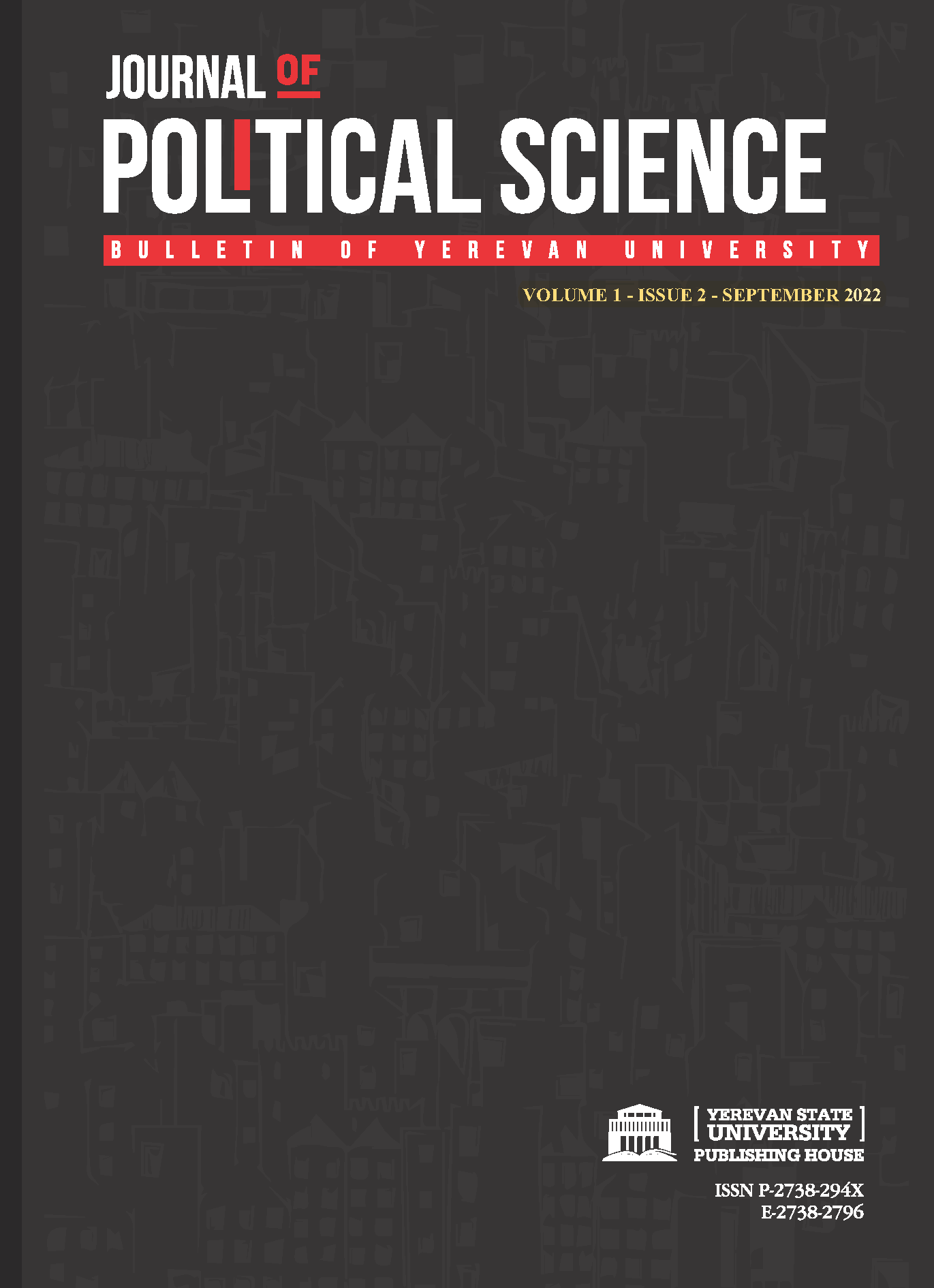Erdogan against Turkey։ Stalemate of “Patriot-F-35-S-400” triangle
DOI:
https://doi.org/10.46991/JOPS/2022.1.2.049Keywords:
Turkish Air Force, Russia, USA, NATO, authoritarianism, July 15 coup attempt, historical memory, symbolismAbstract
After the attempted military coup in 2016, Turkey began to show interest in the Russian S-400 systems, and initially there was an impression that Turkey was only bluffing, was simply using Russia in its relations with the United States (as it had previously done with China (CPMIEC) in the same matter) and was seeking to show the US that it had an alternative (S-400). However, Turkey showed its persistence, and was able to buy these systems quite quickly, despite the fact that the United States strongly opposed it. In this context, this study aims to clarify the main reasons for Turkey's persistence on this issue, taking into account the personal factor of Erdogan.
The article also analyzes the authoritarian strengthening of militarism and Erdogan’s personal factor for buying the S-400, who was the beneficiary of buying the S-400 systems. This article shows that sometimes Erdogan’s personal interests and Turkey’s state interests should be separated from each other, that in some cases Erdogan’s personal interests and Turkey’s state interests may or may not coincide partially or completely․ It is emphasized that in each case of conflict of interests, Erdogan’s personal interests prevail, that the problems should be examined first of all from the perspective of Erdogan’s personal interests and not from Turkey’s state interests, otherwise many things remain unclear and unexplained.
Focusing on Turkey’s purchase of the S-400 systems, this study also asks why NATO member Turkey even after the purchase has not given up those Russian systems and why it still continues to persist․ The topic is also actual for Armenia, as it is related to the sphere of the Turkish Air Force and the defense capability of Turkey in general, its prospects. The article describes the brief history of Turkey’s purchase of S-400 systems, analyzes the motives of that move from territorial, temporal, cause-and-effect, and other perspectives, and presents Turkey’s attempts to get out of the existing situation. This study aims to identify the main trends underlying the conflict between Erdogan and the Turkish political elite over the purchase of the S-400.
References
Cross, William, and André Blais. 2012. “Who selects the party leader?” Party Politics 18 (2): 127-150. https://doi.org/10.1177/1354068810382935.
Green, Jeffrey Edward. 2008. “Max Weber and the Reinvention of Popular Power.” Max Weber Studies 8 (2): 187-224.
Gulmez, Didem Buhari. 2020. “The resilience of the US-Turkey alliance: divergent threat perceptions and worldviews.” Contemporary Politics 26 (4): 475-492. https://doi.org/10.1080/13569775.2020.1777038.
Guo, Xiaoli. 2017. “Is Turkey Acting Fairly? - Turkey’s Choice in T-LORAMIDS.” Asian Journal of Middle Eastern and Islamic Studies 11 (2): 69-89. https://doi.org/10.1080/25765949.2017.12023302.
Harmel, Robert, and Lars Svåsand. 1993. “Party leadership and party institutionalisation: Three phases of development.” West European Politics 16 (2): 67-88. https://doi.org/10.1080/01402389308424961.
Kasapoğlu, Can, and Sinan Ülgen. 2019. “Strategic weapons systems in the Turkey-Russia-US triangle.” EDAM, Foreign Policy & Security 2 (January): 1-9:
Kasapoğlu, Can. 2021. “Türk Hava gücünün en zor on yılı: Hava harp trendleri, tehdit ortamı analizi ve türk hava kuvvetleri’nin 5. nesil geleceği.” EDAM, Dış Politika & Güvenlik 2 (Ocak): 1-29.
Kaynar, Ayşegül Kars. 2022. “Post-2016 military restructuring in Turkey from the perspective of coup-proofing.” Turkish Studies 23 (3): 383-406. https://doi.org/10.1080/14683849.2021.1977631.
Kazan, Isil. 2005. “Turkey: Where Geopolitics still matters.” Contemporary Security Policy 26 (3): 588-604. https://doi.org/10.1080/13523260500500906.
Kemp, Herb. 2020. “Strategic Security in Northern Europe: The Implications of Russian Anti-Access/Area Denial Strategies in Developing Complex Threat Environments.” Journal of Strategic Security 14 (1): 78-91.
Kibaroğlu, Mustafa. 2019. “On Turkey’s Missile Defense Strategy: The Four Faces of the S-400 Deal between Turkey and Russia.” PERCEPTIONS (Autumn-Winter) XXIV (2-3): 159-174.
Kilker, Ernest. 1989. “Max Weber and Plebiscitarian Democracy: A Critique of the Mommsen Thesis.” International Journal of Politics, Culture, and Society 2 (4): 429-465.
Klein, Steven. 2016. “Between Charisma and Domination: On Max Weber’s Critique of Democracy.” The Journal of Politics 79 (1): 179-192. http://dx.doi.org/10.1086/687323.
Magalhães, Pedro T. 2022. “Charisma and Democracy: Max Weber on the Riddle of Political Change in Modern Societies.” Topoi 41: 69-78. https://doi.org/10.1007/s11245-021-09761-2.
Radomyski, Adam. 2021. “Development of the russian anti access/anti denial (A2/AD) concept as a threat to NATO and Poland.” Torun Internatonal Studies 1 (14): 41-54. https://doi.org/10.12775/TIS.2021.004575/TIS.2021.004.
Shaw, Tamsin. 2008.“Max Weber on Democracy: Can the People Have Political Power in Modern States?” Constellations 15 (1): 33-45. https://doi.org/10.1111/j.1467-8675.2008.00472.x.
Shcherbak, Svetlana. 2021. “Max Weber and the Modern Plebiscitary Democracy: Weber’s legacy: at the crossroads of traditions.” Filosofska Dumka 1: 135-148. https://doi.org/10.15407/fd2021.01.135.
Strom, Kaare. 1990. “A Behavioral Theory of Competitive Political Parties.” American Journal of Political Science 34 (2): 565–98. https://doi.org/10.2307/2111461.
Surkov, Nikolay Yu. 2020. “Charismatic Leadership in the Middle East and North Africa in the 21 st Century: Regional Specifics and Prospects for the Evolution of the Phenomenon.” MGIMO Review of International Relations 13 (2): 123-140. https://doi.org/10.24833/2071-8160-2020-2-71-123-140.
Triantama, Febry, Cancera Triane Berliana, and Muhammad Yusril I’za. 2022. “The failure of the United States coercive diplomacy in the era of President Donald Trump: Turkey’s persistence in buying S-400.” Masyarakat, Kebudayaan dan Politik 35 (1): 58-68․ https://doi.org/10.20473/mkp.V35I12022.58-68.
Vicentini, Giulia, and Andrea Pritoni. 2021. “The Rise and Fall of Party Leaders: Exploring Leadership Selection, Re-Selection, and De-Selection Using Qualitative Comparative Analysis.” Italian Political Science Review/Rivista Italiana Di Scienza Politica 51 (3): 373-388. https://doi.org/10.1017/ipo.2021.6.
Willner, Ann Ruth, and Dorothy Willner. 1965 “The Rise and Role of Charismatic Leaders.” The Annals of the American Academy of Political and Social Science 358: 77-88.
Zvyagelskaya, Irina. 2019. “Symbols and Values in International Relations in the Middle East.” Polis. Political Studies 1: 105-123.
Downloads
Published
Issue
Section
License
Copyright (c) 2022 Hayk Gabrielyan

This work is licensed under a Creative Commons Attribution-NonCommercial 4.0 International License.



